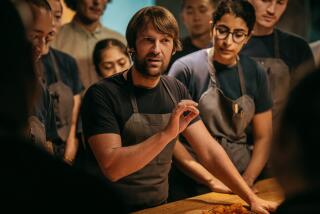Chefs, Scientists Cook Up Future of Food
- Share via
Shop in a store with meatless burgers and milk that stays fresh for a month, and you may ask yourself: Is it food or is it technology?
Indeed, some research chefs and others in food manufacturing say that technology and the culinary arts have converged. They even have a word for this marriage of food, art and science: culinology.
A term trademarked by the Research Chefs Assn., a food industry organization, culinology was the theme of a daylong conference Tuesday at Cal State Northridge.
Whatever it’s called, culinology is the wave of the future, said Mark Crowell, director of culinary development for Starbucks Coffee Co., one of more than 200 food professionals and students at the the 15th annual Southern California Food Conference.
Though Crowell trained as a chef, he had to learn about the science of food on the job, while working for the Marriott Corp. and other large companies.
“I could make great food,” Crowell said, “but I had no idea how to get food manufactured.”
More and more, Crowell said, food companies are looking for people who can do both.
“I just hired a person with a dual food-science and culinary degree,” he said.
Because she is both chef and scientist, he said, “she is both creative and disciplined in a scientific sense. She’s logical, and she uses the tools she learned from her scientific background, but she can also make that leap to the creative side.”
The Research Chefs Assn., which has about 1,100 members, has helped develop a culinology curriculum. A bachelor of science degree in the new field will be offered starting this fall at the University of Nebraska, said past president Jeffrey Cousminer, who heads a flavor laboratory for Firmatech, an international flavor and fragrance company.
Conference organizer Deirdre Larkin, who teaches food science and nutrition at Cal State Northridge, said she thinks it will be helpful to students preparing for food-related careers.
“A lot of our students are trained in the cooking aspect and need to be trained in the scientific aspect, as well,” Larkin said. “They need to know the technology of food, as well as the art associated with it.”
Many Languages in Food World
Behind the scenes, a team of food-science students from CSUN squared off against a team from Cal Poly Pomona to see who could make a better Santa Fe-style meal. During breaks in the program, participants nibbled on student-made doughnuts.
Speaker Thomas Sadler, vice president for research and development at Cargill Custom Dressings, said that culinologists differ from other food professionals in being able to speak more than one of the many languages of the food world.
He gave as an example the term “ticket time.” Those in the audience who had worked in restaurants knew that it means the time between an order’s entering the kitchen and the finished dish’s being handed to the server for delivery to the customer.
People working in the highly collaborative food industry have to be “multilingual,” Sadler said, conversant with the specialized languages of chefs, food manufacturing, food technology and even sales.
To illustrate his straddling of the culinary and technology worlds, Sadler wore his “culinology jacket,” which was half short white chef’s jacket and half long white lab coat.
Not everybody at the conference saw the need for a new kind of professional. Kurt Schneider, a chemical engineer in the food industry, argued for teams of specialists.
He said he had once helped create a new citrus-flavored meal-replacement beverage for the Japanese market. The project was highly successful, said Schneider, who worked as part of a team that included a professional chef and a food chemist.
‘It’s a Whole New World’
“I think the answer is not to have one person who can do everything, but having three professionals who can interact,” Schneider said. “The key is to know what you don’t know and farm it out to the right people.”
Jennifer Cuzens, a recent UC Santa Cruz graduate with a degree in biochemistry and molecular biology, never expected to end up working in the food industry.
“It’s a whole new world,” said Cuzens, who works for the flavorings giant T. Hasegawa U.S.A.
Cuzens said she never thought much about flavorings as a science student, but is now fascinated by such edible wonders as pina colada-flavored jelly beans.
“It’s a mixture between science and creative art, really,” she said. Whatever you call it, she added, “it’s intriguing.”
More to Read
Eat your way across L.A.
Get our weekly Tasting Notes newsletter for reviews, news and more.
You may occasionally receive promotional content from the Los Angeles Times.










